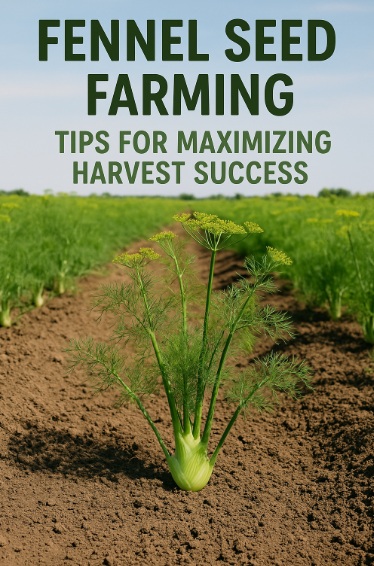Fennel farming is an important part of spice cultivation in India. It is mainly grown in states like Rajasthan, Gujarat, and Madhya Pradesh. The plant grows well in dry, sunny weather and sandy-loam soil. Mostly, the seed is used in cooking, medicine, and herbal products. It can help a farmer earn more and play a key role in India’s spice export market.
You can go through this guide to have a brief overview of each step from land preparation to lost harvesting.
Stepwise Fennel Seed Cultivation Process
Fennel seed cultivation needs to be done with careful steps to have healthy plants and a good yield. Follow the process below to learn about the cultivation process:
Land Preparation
Fennel plants prefer sandy or loamy soil with good drainage. Heavy clay soils can hinder growth by causing root rot due to poor drainage. The soil should be rich in organic matter and have a slightly alkaline ph between 7 and 8.5. Organic matter-rich soil of slightly alkaline ph 7-8.5 is ideal. Farmers should first prepare the soil by ploughing and tilling to crush any clumps in the soil to make it loose.
For this procedure, the Mahindra 275 DI tractor is highly effective. It has a 39 HP engine that will easily perform ploughing and tilling operations. Also, the 33.4 PTO HP and 1200 kg lifting capacity assist you in other agricultural activities. Moreover, the Mahindra tractor price starts from Rs. 6.15 lakh and goes upto Rs. 6.36 lakh.
Sowing
The next step in the cultivation process is planting. However, it is important to check the soil before planting to see if it has been prepared properly. Farmers can create furrows or shallow trenches and plant the seed about 1-2 cm deep. For healthy growth, a spacing of around 30 cm between rows and 15 cm between plants is best.
It will take around 10 to 15 days for the seeds to grow, depending on the soil temperature and moisture. Always keep the soil moist during this process, but do not make it too wet, as it can cause root rot.
Watering and Irrigation
Fennel requires moderate watering to grow well. Farmers should avoid overwatering the plants as this can lead to waterlogging and root rot. The soil should remain moist but not soggy. During the germination period, regular watering is necessary to help them sprout. Once the plants have grown, watering should be reduced but still regular, especially during dry spells.
Care and Maintenance
Fennel is a hardy plant, but it still requires proper care to grow successfully. Weeding is essential to ensure that the plants do not compete for nutrients and water. Weeds can be removed by hand or with the help of a hoe. Mulching around the plants is also helpful, as it helps to retain soil moisture and suppress weeds.
In addition, pruning the plant is another critical care aspect. Although it may not need heavy pruning, dead or damaged leaf removal will ensure the plant diverts its energy to production.
Pest and Disease Control
Fennel plants usually do not get many pests, but some common insects like aphids, caterpillars, and beetles can still harm the plants. Farmers can use good insects like ladybugs to stop these bad insects. They can also use neem oil or soap spray to control pests without harming nature.
The plants can also get some diseases caused by fungus, like downy mildew and powdery mildew. These diseases spread more when the weather is wet. To stop them, farmers should leave enough space between plants, let air move around, and remove any infected leaves regularly.
Harvesting
The plant is ready for harvest when the seeds are dried and turn a crisp brown colour. This usually happens about 4 to 5 months after planting, depending on the climate and planting technique. Farmers should wait for the right time because if they are early, then the seeds will be small and of poor quality. In addition, the best time to carry out this process is in the late morning, while they are fresh and full of natural oils.
Post-Harvest Management
After harvesting, seeds need to be dried properly to preserve their flavour and quality. Farmers should store them in airtight containers to keep them fresh and prevent them from losing their aromatic properties. The storage area should be cool, dry, and dark to avoid exposure to moisture and sunlight.
To make these tasks easier, many farmers use the Sonalika DI 35 tractor. It is equipped with a 39 HP engine that provides wonderful fuel efficiency. The powerful design and smooth mobility enable farmers to handle farming work efficiently. Further, the Sonalika tractor price ranges between Rs. 5.64 lakh and Rs. 5.98 lakh.
Final Words
Fennel cultivation in India is highly beneficial for farmers. With proper conditions to grow and taking the necessary care, it can prove to be a very rewarding as well as profitable business opportunity. Farming this seed will not only increase your income but also help India’s agriculture and spice industry to grow.
